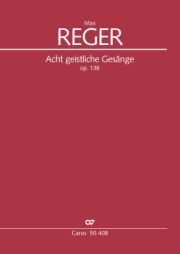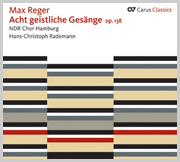Simple and Harmonically Brilliant
For Stefan Schuck, Reger’s great chorale variations for organ are like the peaks of the Himalayas: inaccessible, massive, and daunting. Discover why Reger’s Acht geistliche Gesänge op. 138 are amongst his very favorite works of all.
We are marking the 100th anniversary of Reger’s death this year in a somewhat muted way. Initially, I found Reger’s music very difficult. For me, an organist with small hands and certainly no virtuoso, Reger’s great chorale variations were like the peaks of the Himalayas: inaccessible, massive, and daunting. But since then, some of Reger’s intimate vocal works have become absolute favorites of mine, and some of the pieces from his Acht geistliche Gesänge op. 138 alone would be enough for me to place Reger amongst the very greatest.
The Advent motet “Und unser lieben Frauen” now belongs to the standard repertoire, but far less well-known are the other seven compositions from this collection.
Right at the start of the collection, which was begun in 1914, the year of the outbreak of the First World War, is the eight-part motet “Der Mensch lebt und bestehet”, which stands like a credo for the whole set. This composition is the only one in the collection in eight parts, as well as being the only one not based on a chorale, setting it apart from the rest of the pieces. Reger does not employ a boisterous fugue here, nor a triple forte, but a skilful eight-part homophonic setting to express his deeply-felt conviction “…und wir in SEINEN Händen” [and we in HIS hands ]. This should not be sung too slowly, over-indulging each harmony. In the last hours before his unexpected death in the Hotel Hentschel in Leipzig, he had the proofs of these exact measures before him.
The chorale settings are both simple, yet at the same time harmonically brilliant: every choir with secure intonation should have “Morgengesang” and “Nachtlied” from this collection in its repertoire. In these short choral settings, for me what Reger so powerfully expresses is what his friend Karl Straube so elegantly formulated in a letter to Willibald Gurlitt:
“For that is what is characteristic of Reger’s personality and art: he always saw that which was actually precious in the transcendental, spiritual things.”
The conductor and church musician Stefan Schuck works freelance for Carus.






Leave a Reply
Want to join the discussion?Feel free to contribute!